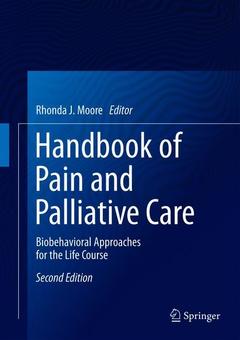Handbook of Pain and Palliative Care (2nd Ed., 2nd ed. 2018) Biopsychosocial and Environmental Approaches for the Life Course
Coordonnateur : Moore Rhonda J.

This comprehensive revision of the invaluable reference presents a rigorous survey of pain and palliative care phenomena across the lifespan and across disciplines. Grounded in the biopsychosocial viewpoint of its predecessor, it offers up-to-date understanding of assessments and interventions for pain, the communication of pain, common pain conditions and their mechanisms, and research and policy issues. In keeping with the current public attention to painkiller use and misuse, contributors discuss a full range of pharmacological and non-pharmacological approaches to pain relief and management. And palliative care is given expanded coverage, with chapters on interventive, ethical, and spiritual concerns.
· Pain, intercultural communication, and narrative medicine.
· Assessment of pain: tools, challenges, and special populations.
· Persistent pain in the older adult: practical considerations for evaluation and management.
· Acute to chronic pain: transition in the post-surgical patient.
· Evidence-based pharmacotherapy of chronic pain.
· Complementary and integrative health in chronic pain and palliative care.
· The patient?s perspective of chronic pain.· Disparities in pain and pain care.
This mix of evolving and emerging topics makes the Second Edition of the Handbook of Pain and Palliative Care a necessity for health practitioners specializing in pain management or palliative care, clinical and health psychologists, public health professionals, and clinicians and administrators in long-term care and hospice.
Biopsychosocial approaches to understanding chronic pain and disability.- Communication and Pain.- Pain and intercultural communication.- Truth telling and palliative care.- Communiatona nd palliative care: e-health interventions and pain management.- Educating patients and caregivers about pain management: what clinicians need to know.- Assessment of Pain.- Pain assessment tools in palliative cancer care.- Quality indicators for pain in palliative care.- Palliative care clinical trials: generalizability and applicability in hospice and palliative care practice.- Dynamic pain assessment: an application of clinical infometrics in personalized pain treatment and management.- Assessing pain and unmet need in patients with advanced dementia: the role of the serial trial intervention.- Common Pain Conditions.- Pediatric chronic pain.- Pain in the older person.- Pain after traumatic brain injury.- Pain in the battlefield injured.- Pain, whiplash disorder, and traffic safety.- Chronic low back pain.- Adult cancer-related pain.- Mechanisms of Pain.- Neuroanatomy of pain and pain pathways.- Acute to chronic pain: transition in the post-surgical patient.- Pain and the placebo/nocebo effect.- Sex differences in pain across the life course.- Stress and pain.- Hope in the context of pain and palliative care.- Temporomandibular disorder and its relationship with fibromyalgia.- Phantom limb pain.- Pharmacogenetics of pain: the future of personalized medicine.- Pain imaging.- Interventions for Pain.- Evidence-based pharmacotherapy of chronic pain.- Chronic pain and opioids.- Nerve blocks, trigger points, and intrathecal therapy for chronic pain.- Neurosurgical interventions for the control of chronic pain conditions.- Rehabilitation treatments for chronic musculoskeletal pain.- Psychosocial, Complementary and Alternative, and Spiritual Approaches for the Control of Symptoms.- Pain, depression, and anxiety in cancer.- Support groups for chronic pain.- CAM in chronic pain and palliative care.- Spiritual dimensions of pain and suffering.- Perspectives on Pain from the Humanities and Social Sciences.- Suffering, hope, and healing.- Narrative and pain: towards an integrative model.- Representations of the body in pain: anthropological approaches.- The art of pain: the patient’s perspective of chronic pain.- Ethical Issues and Future Directions.- Disparities in pain management and palliative care.- The delineation and explication of palliative options of last resort.- Recognition and resolution of ethical barriers to palliative care research.- How health care reform can improve access to quality pain and palliative care services.
Rhonda Moore, PhD is a Medical Anthropologist and Social Scientist She received her doctoral degree in cultural and medical anthropology from Stanford University and completed her post-doctoral fellowships in behavioral science from Stanford Medical School and in epidemiology at the University of Texas M.D. Anderson Cancer Center. Dr. Moore has edited or co-edited three other books for Springer: Cancer, Culture and Communication (2004), Biobehavioral Approaches to Pain (2009), and Handbook of Pain and Palliative Care,First Edition (2013). Her primary research interests are biobehavioral mechanisms of health and disease in cancer and pain, patient reported outcomes, qualitative methods, bioethics of privacy and security, and health disparities and vulnerable populations with special attention to chronic pain and palliative care.
An interdisciplinary treatment of the sociocultural, biologic, environmental, psychological, and existential aspects of chronic pain and palliative care
Provides an update and expansion of the first edition, published in 2013
Includes new categories of pain and palliative care research in contributions from North America, Europe, and Asia
New categories include pain epidemiology research; pain assessment; Artificial Intelligence and Pain; Virtual Reality in the Management of Acute and Procedural Pain; Digital Therapeutics in the Management of Chronic Pain; and Policy Opportunities to Improve Access to Quality Pain and Palliative Care
Date de parution : 06-2019
Ouvrage de 902 p.
17.8x25.4 cm
Thèmes de Handbook of Pain and Palliative Care :
Mots-clés :
biopsychosocial aspects of pain; pain and intercultural communication; quality indicators for pain in palliative care; disparities in pain management and palliative care; ethical aspects of palliative care reserach; health care reform for pain and palliative care services; pediatric chronic pain; geriatric chronic pain; pain in battle injured; cancer-related pain; chronic low back pain; neuroanatomy of pain and pain pathways; pain and placebo/nocebo effect; sex differences in pain; stress and pain; phantom limb pain; pharmacotherpay of chronic pain; chronic pain and opioids; chronic musculorskeletal pain; narratives and pain


